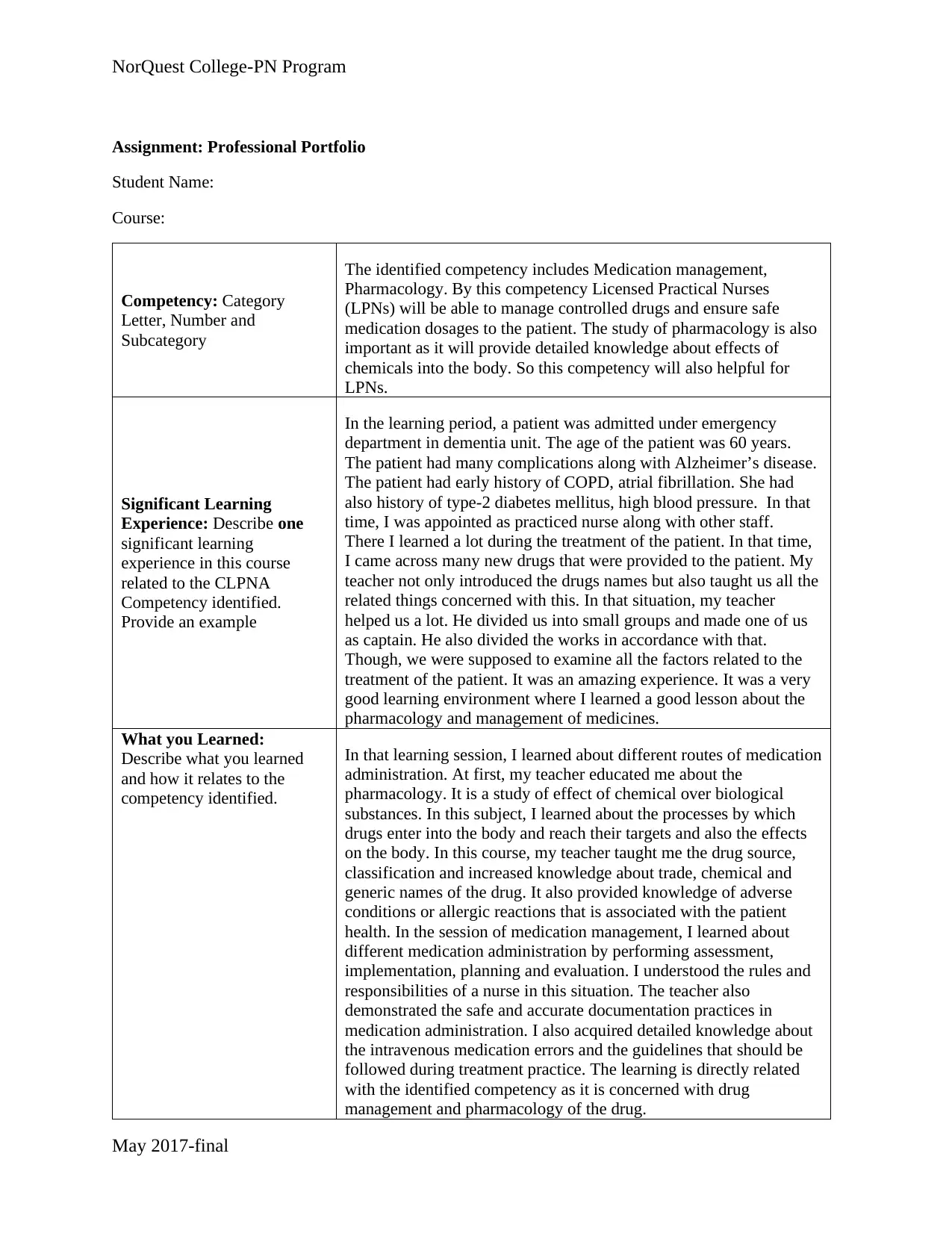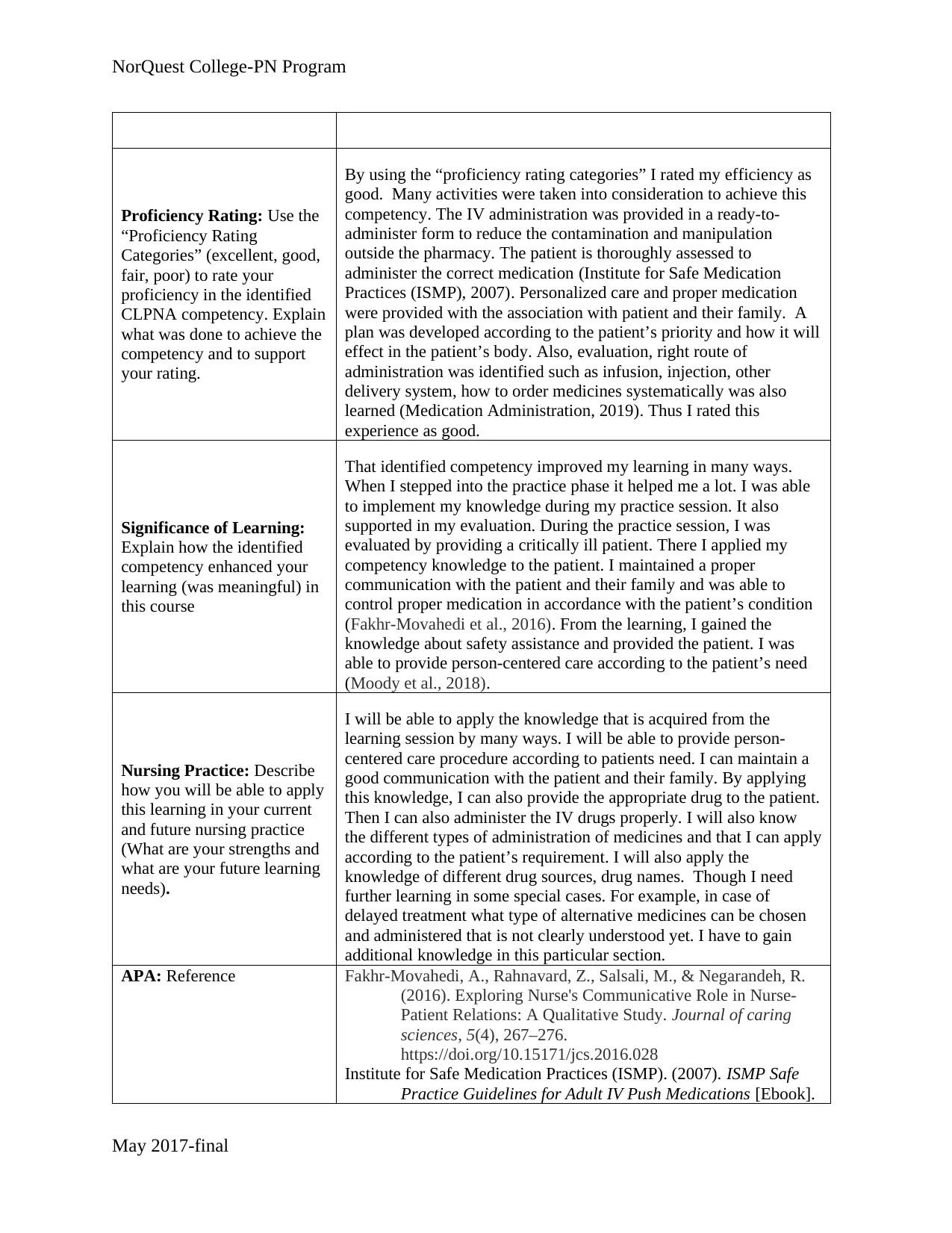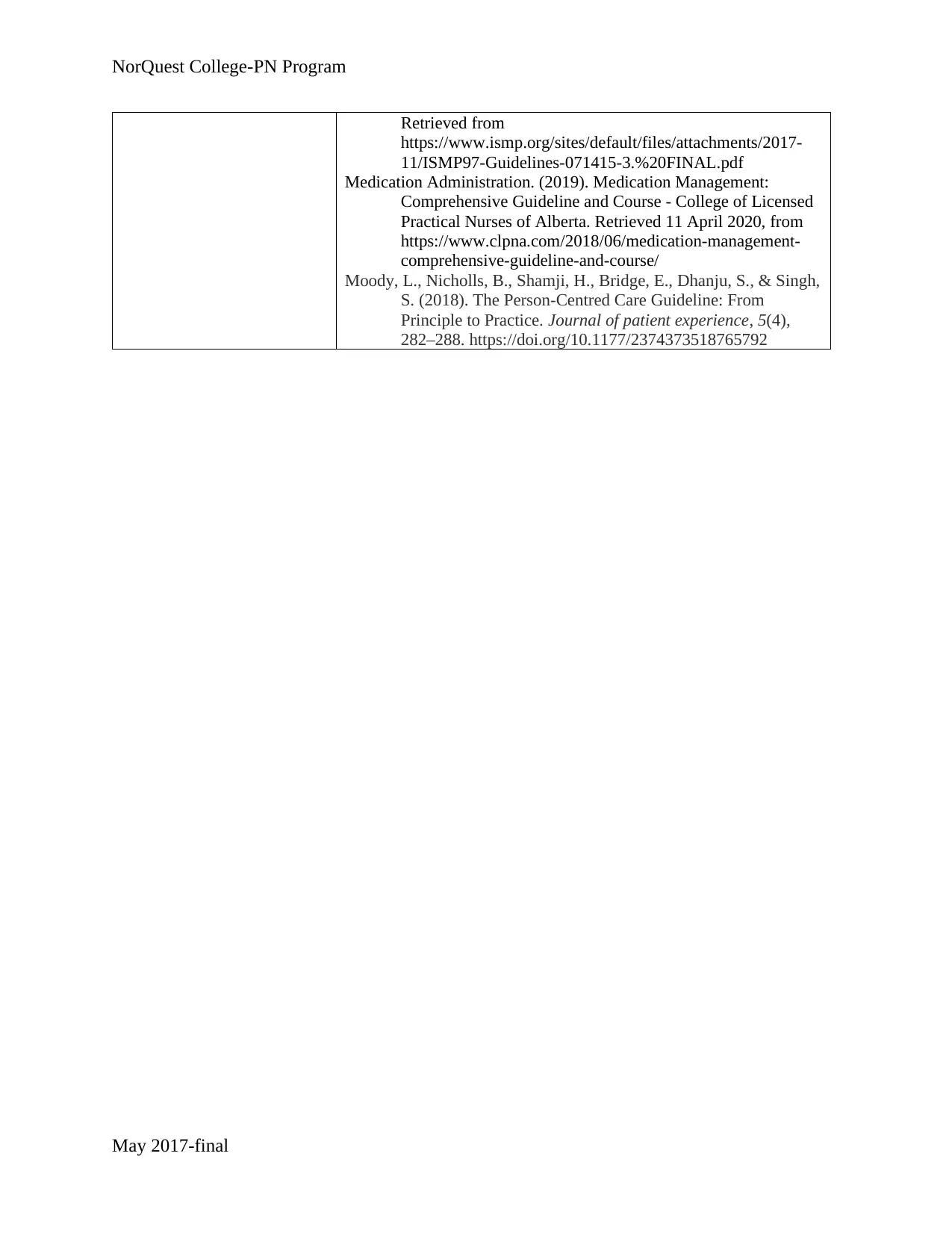Professional Portfolio: Medication Management, NorQuest College PN
VerifiedAdded on 2022/09/15
|3
|1243
|16
Portfolio
AI Summary
This professional portfolio assignment from a student in the NorQuest College PN program focuses on the CLPNA competency of medication management and pharmacology. The student describes a significant learning experience involving a patient with multiple health complications, highlighting the application of pharmacological knowledge and medication administration. The student details what they learned about different routes of medication administration, drug classifications, and the responsibilities of a nurse in medication management. They rate their proficiency as good, supported by their actions in providing patient-centered care, proper medication administration, and safe documentation practices. The portfolio explains how the competency enhanced their learning, particularly in practice settings, and outlines how they will apply this knowledge in their current and future nursing practice, while also identifying areas for further learning, such as alternative medications. The assignment includes APA-formatted references to support the student's claims and demonstrates the student's understanding of safe medication practices and patient care.

NorQuest College-PN Program
Assignment: Professional Portfolio
Student Name:
Course:
Competency: Category
Letter, Number and
Subcategory
The identified competency includes Medication management,
Pharmacology. By this competency Licensed Practical Nurses
(LPNs) will be able to manage controlled drugs and ensure safe
medication dosages to the patient. The study of pharmacology is also
important as it will provide detailed knowledge about effects of
chemicals into the body. So this competency will also helpful for
LPNs.
Significant Learning
Experience: Describe one
significant learning
experience in this course
related to the CLPNA
Competency identified.
Provide an example
In the learning period, a patient was admitted under emergency
department in dementia unit. The age of the patient was 60 years.
The patient had many complications along with Alzheimer’s disease.
The patient had early history of COPD, atrial fibrillation. She had
also history of type-2 diabetes mellitus, high blood pressure. In that
time, I was appointed as practiced nurse along with other staff.
There I learned a lot during the treatment of the patient. In that time,
I came across many new drugs that were provided to the patient. My
teacher not only introduced the drugs names but also taught us all the
related things concerned with this. In that situation, my teacher
helped us a lot. He divided us into small groups and made one of us
as captain. He also divided the works in accordance with that.
Though, we were supposed to examine all the factors related to the
treatment of the patient. It was an amazing experience. It was a very
good learning environment where I learned a good lesson about the
pharmacology and management of medicines.
What you Learned:
Describe what you learned
and how it relates to the
competency identified.
In that learning session, I learned about different routes of medication
administration. At first, my teacher educated me about the
pharmacology. It is a study of effect of chemical over biological
substances. In this subject, I learned about the processes by which
drugs enter into the body and reach their targets and also the effects
on the body. In this course, my teacher taught me the drug source,
classification and increased knowledge about trade, chemical and
generic names of the drug. It also provided knowledge of adverse
conditions or allergic reactions that is associated with the patient
health. In the session of medication management, I learned about
different medication administration by performing assessment,
implementation, planning and evaluation. I understood the rules and
responsibilities of a nurse in this situation. The teacher also
demonstrated the safe and accurate documentation practices in
medication administration. I also acquired detailed knowledge about
the intravenous medication errors and the guidelines that should be
followed during treatment practice. The learning is directly related
with the identified competency as it is concerned with drug
management and pharmacology of the drug.
May 2017-final
Assignment: Professional Portfolio
Student Name:
Course:
Competency: Category
Letter, Number and
Subcategory
The identified competency includes Medication management,
Pharmacology. By this competency Licensed Practical Nurses
(LPNs) will be able to manage controlled drugs and ensure safe
medication dosages to the patient. The study of pharmacology is also
important as it will provide detailed knowledge about effects of
chemicals into the body. So this competency will also helpful for
LPNs.
Significant Learning
Experience: Describe one
significant learning
experience in this course
related to the CLPNA
Competency identified.
Provide an example
In the learning period, a patient was admitted under emergency
department in dementia unit. The age of the patient was 60 years.
The patient had many complications along with Alzheimer’s disease.
The patient had early history of COPD, atrial fibrillation. She had
also history of type-2 diabetes mellitus, high blood pressure. In that
time, I was appointed as practiced nurse along with other staff.
There I learned a lot during the treatment of the patient. In that time,
I came across many new drugs that were provided to the patient. My
teacher not only introduced the drugs names but also taught us all the
related things concerned with this. In that situation, my teacher
helped us a lot. He divided us into small groups and made one of us
as captain. He also divided the works in accordance with that.
Though, we were supposed to examine all the factors related to the
treatment of the patient. It was an amazing experience. It was a very
good learning environment where I learned a good lesson about the
pharmacology and management of medicines.
What you Learned:
Describe what you learned
and how it relates to the
competency identified.
In that learning session, I learned about different routes of medication
administration. At first, my teacher educated me about the
pharmacology. It is a study of effect of chemical over biological
substances. In this subject, I learned about the processes by which
drugs enter into the body and reach their targets and also the effects
on the body. In this course, my teacher taught me the drug source,
classification and increased knowledge about trade, chemical and
generic names of the drug. It also provided knowledge of adverse
conditions or allergic reactions that is associated with the patient
health. In the session of medication management, I learned about
different medication administration by performing assessment,
implementation, planning and evaluation. I understood the rules and
responsibilities of a nurse in this situation. The teacher also
demonstrated the safe and accurate documentation practices in
medication administration. I also acquired detailed knowledge about
the intravenous medication errors and the guidelines that should be
followed during treatment practice. The learning is directly related
with the identified competency as it is concerned with drug
management and pharmacology of the drug.
May 2017-final
Paraphrase This Document
Need a fresh take? Get an instant paraphrase of this document with our AI Paraphraser

NorQuest College-PN Program
Proficiency Rating: Use the
“Proficiency Rating
Categories” (excellent, good,
fair, poor) to rate your
proficiency in the identified
CLPNA competency. Explain
what was done to achieve the
competency and to support
your rating.
By using the “proficiency rating categories” I rated my efficiency as
good. Many activities were taken into consideration to achieve this
competency. The IV administration was provided in a ready-to-
administer form to reduce the contamination and manipulation
outside the pharmacy. The patient is thoroughly assessed to
administer the correct medication (Institute for Safe Medication
Practices (ISMP), 2007). Personalized care and proper medication
were provided with the association with patient and their family. A
plan was developed according to the patient’s priority and how it will
effect in the patient’s body. Also, evaluation, right route of
administration was identified such as infusion, injection, other
delivery system, how to order medicines systematically was also
learned (Medication Administration, 2019). Thus I rated this
experience as good.
Significance of Learning:
Explain how the identified
competency enhanced your
learning (was meaningful) in
this course
That identified competency improved my learning in many ways.
When I stepped into the practice phase it helped me a lot. I was able
to implement my knowledge during my practice session. It also
supported in my evaluation. During the practice session, I was
evaluated by providing a critically ill patient. There I applied my
competency knowledge to the patient. I maintained a proper
communication with the patient and their family and was able to
control proper medication in accordance with the patient’s condition
(Fakhr-Movahedi et al., 2016). From the learning, I gained the
knowledge about safety assistance and provided the patient. I was
able to provide person-centered care according to the patient’s need
(Moody et al., 2018).
Nursing Practice: Describe
how you will be able to apply
this learning in your current
and future nursing practice
(What are your strengths and
what are your future learning
needs).
I will be able to apply the knowledge that is acquired from the
learning session by many ways. I will be able to provide person-
centered care procedure according to patients need. I can maintain a
good communication with the patient and their family. By applying
this knowledge, I can also provide the appropriate drug to the patient.
Then I can also administer the IV drugs properly. I will also know
the different types of administration of medicines and that I can apply
according to the patient’s requirement. I will also apply the
knowledge of different drug sources, drug names. Though I need
further learning in some special cases. For example, in case of
delayed treatment what type of alternative medicines can be chosen
and administered that is not clearly understood yet. I have to gain
additional knowledge in this particular section.
APA: Reference Fakhr-Movahedi, A., Rahnavard, Z., Salsali, M., & Negarandeh, R.
(2016). Exploring Nurse's Communicative Role in Nurse-
Patient Relations: A Qualitative Study. Journal of caring
sciences, 5(4), 267–276.
https://doi.org/10.15171/jcs.2016.028
Institute for Safe Medication Practices (ISMP). (2007). ISMP Safe
Practice Guidelines for Adult IV Push Medications [Ebook].
May 2017-final
Proficiency Rating: Use the
“Proficiency Rating
Categories” (excellent, good,
fair, poor) to rate your
proficiency in the identified
CLPNA competency. Explain
what was done to achieve the
competency and to support
your rating.
By using the “proficiency rating categories” I rated my efficiency as
good. Many activities were taken into consideration to achieve this
competency. The IV administration was provided in a ready-to-
administer form to reduce the contamination and manipulation
outside the pharmacy. The patient is thoroughly assessed to
administer the correct medication (Institute for Safe Medication
Practices (ISMP), 2007). Personalized care and proper medication
were provided with the association with patient and their family. A
plan was developed according to the patient’s priority and how it will
effect in the patient’s body. Also, evaluation, right route of
administration was identified such as infusion, injection, other
delivery system, how to order medicines systematically was also
learned (Medication Administration, 2019). Thus I rated this
experience as good.
Significance of Learning:
Explain how the identified
competency enhanced your
learning (was meaningful) in
this course
That identified competency improved my learning in many ways.
When I stepped into the practice phase it helped me a lot. I was able
to implement my knowledge during my practice session. It also
supported in my evaluation. During the practice session, I was
evaluated by providing a critically ill patient. There I applied my
competency knowledge to the patient. I maintained a proper
communication with the patient and their family and was able to
control proper medication in accordance with the patient’s condition
(Fakhr-Movahedi et al., 2016). From the learning, I gained the
knowledge about safety assistance and provided the patient. I was
able to provide person-centered care according to the patient’s need
(Moody et al., 2018).
Nursing Practice: Describe
how you will be able to apply
this learning in your current
and future nursing practice
(What are your strengths and
what are your future learning
needs).
I will be able to apply the knowledge that is acquired from the
learning session by many ways. I will be able to provide person-
centered care procedure according to patients need. I can maintain a
good communication with the patient and their family. By applying
this knowledge, I can also provide the appropriate drug to the patient.
Then I can also administer the IV drugs properly. I will also know
the different types of administration of medicines and that I can apply
according to the patient’s requirement. I will also apply the
knowledge of different drug sources, drug names. Though I need
further learning in some special cases. For example, in case of
delayed treatment what type of alternative medicines can be chosen
and administered that is not clearly understood yet. I have to gain
additional knowledge in this particular section.
APA: Reference Fakhr-Movahedi, A., Rahnavard, Z., Salsali, M., & Negarandeh, R.
(2016). Exploring Nurse's Communicative Role in Nurse-
Patient Relations: A Qualitative Study. Journal of caring
sciences, 5(4), 267–276.
https://doi.org/10.15171/jcs.2016.028
Institute for Safe Medication Practices (ISMP). (2007). ISMP Safe
Practice Guidelines for Adult IV Push Medications [Ebook].
May 2017-final

NorQuest College-PN Program
Retrieved from
https://www.ismp.org/sites/default/files/attachments/2017-
11/ISMP97-Guidelines-071415-3.%20FINAL.pdf
Medication Administration. (2019). Medication Management:
Comprehensive Guideline and Course - College of Licensed
Practical Nurses of Alberta. Retrieved 11 April 2020, from
https://www.clpna.com/2018/06/medication-management-
comprehensive-guideline-and-course/
Moody, L., Nicholls, B., Shamji, H., Bridge, E., Dhanju, S., & Singh,
S. (2018). The Person-Centred Care Guideline: From
Principle to Practice. Journal of patient experience, 5(4),
282–288. https://doi.org/10.1177/2374373518765792
May 2017-final
Retrieved from
https://www.ismp.org/sites/default/files/attachments/2017-
11/ISMP97-Guidelines-071415-3.%20FINAL.pdf
Medication Administration. (2019). Medication Management:
Comprehensive Guideline and Course - College of Licensed
Practical Nurses of Alberta. Retrieved 11 April 2020, from
https://www.clpna.com/2018/06/medication-management-
comprehensive-guideline-and-course/
Moody, L., Nicholls, B., Shamji, H., Bridge, E., Dhanju, S., & Singh,
S. (2018). The Person-Centred Care Guideline: From
Principle to Practice. Journal of patient experience, 5(4),
282–288. https://doi.org/10.1177/2374373518765792
May 2017-final
⊘ This is a preview!⊘
Do you want full access?
Subscribe today to unlock all pages.

Trusted by 1+ million students worldwide
1 out of 3
Related Documents
Your All-in-One AI-Powered Toolkit for Academic Success.
+13062052269
info@desklib.com
Available 24*7 on WhatsApp / Email
![[object Object]](/_next/static/media/star-bottom.7253800d.svg)
Unlock your academic potential
Copyright © 2020–2026 A2Z Services. All Rights Reserved. Developed and managed by ZUCOL.





